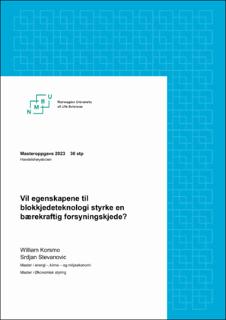| dc.contributor.advisor | Jens Bengtsson | |
| dc.contributor.author | Stevanovic, Srdjan | |
| dc.contributor.author | Korsmo, William Årmot | |
| dc.date.accessioned | 2023-07-06T16:28:43Z | |
| dc.date.available | 2023-07-06T16:28:43Z | |
| dc.date.issued | 2023 | |
| dc.identifier | no.nmbu:wiseflow:6839595:54592502 | |
| dc.identifier.uri | https://hdl.handle.net/11250/3076796 | |
| dc.description.abstract | Blokkjedeteknologi har åpnet dører for desentraliserte nettverk, transaksjoner og verdioverføring. For mange vil blokkjedeteknologi være assosiert med kryptovalutaer som Bitcoin og Ethereum. Imidlertid ser vi at teknologien ikke utelukkende er forbeholdt finanssektoren, men heller fungerer som en grunnmur for å skape tillit mellom virksomheter og dens interessenter. Med denne avhandlingen ønsker vi å belyse bruken av blokkjedeteknologi, dens egenskaper, og om teknologien vil kunne styrke en bærekraftig forsyningskjede. Denne tematikken har fått begrenset forskningsoppmerksomhet til tross for sin kontinuerlige utvikling.
For å kunne besvare problemstillingen på best mulig måte, har vi trukket frem tre underspørsmål som skal være bærebjelker for oppgaven. Gjennom avhandlingen har vi utforsket om egenskapene til blokkjedeteknologi vil kunne styrke en bærekraftig forsyningskjede. Empirisk forskning for denne oppgaven baserer seg på dybdeintervju med konsulenter og eksperter som er tilbydere av tjenester knyttet til blokkjedeteknologi. Disse intervjuene gir innsikt i hvordan aktører anvender teknologien i sine forsyningskjeder. Videre er tidligere forskning og bruk av teknologien i forsyningskjeder kartlagt gjennom litteratursøk og casestudier. Som et resultat av dette ble det utført en analyse som tolket funnene i lys av eksisterende teori om blokkjedeteknologi og bærekraft.
Oppgavens funn viser at private og offentlige blokkjeder kan ha en betydning for å skape og sikre bærekraftige aktiviteter i forsyningskjeden. Teknologien bidrar til å skape mer transparente forsyningskjeder, samt bedre samarbeid mellom forsyningsleddene gjennom økt interoperabilitet. Vi ser også at blokkjedeteknologien øker mulighetene for å dele informasjon, noe som resulterer i økt informasjonintegrasjon. Et ytterligere funn er at smartkontrakter kan brukes til å ressursoptimalisere produksjonsaktiviteter. Dette kan redusere faktorer som har negative innvirkninger på bærekraft. Videre ser vi at blokkjedeteknologien kombinert med sporing muliggjør troverdig markedsføring av bærekraftige tiltak. Dette kommer av at teknologien kan gi økt troverdighet og tillit til konsumentene, noe som kan forbedre virksomhetens omdømme. Funnene tyder på at egenskapene til teknologien kan bidra til å skape og sikre aktiviteter som har direkte inngripen på bærekraft. | |
| dc.description.abstract | Blockchain technology has opened doors for decentralized networks, transactions, and value transfers. For many, blockchain technology is associated with cryptocurrencies such as Bitcoin and Ethereum. However, we see that the technology is not exclusively reserved for the financial sector, but rather serves as a foundation for building trust between businesses and their stakeholders. With this thesis, we aim to shed light on the use of blockchain technology, its characteristics, and whether the technology can strengthen a sustainable supply chain. The topic has almost not been researched and is continuously developing.
To answer the research question as good as possible, we have identified three sub-questions that will be the main pillars of the thesis. Throughout the thesis, we have explored whether the characteristics of blockchain technology can strengthen a sustainable supply chain. Empirical research for this thesis is based on in-depth interviews with consultants and experts who provide services related to blockchain technology. These interviews provide insight into how business use the technology in their supply chains. Furthermore, previous research and the use of technology in supply chains have been mapped through literature searches and case studies. As a result of this, an analysis was conducted that interpreted the findings in light of existing theory on blockchain technology and sustainability.
The findings of the thesis show that private and public blockchains can have an impact on creating and ensuring sustainable activities in the supply chain. The technology contributes to creating more transparent supply chains, as well as better collaboration between supply chain links through increased interoperability. We also see that blockchain technology increases opportunities for sharing information, resulting in increased information integration. An additional finding is that smart contracts can be used to optimize production activities, which can reduce factors that have negative impacts on sustainability. Furthermore, we see that blockchain technology combined with tracking enables credible marketing of sustainable actions. This is because the technology can provide increased credibility and trust to consumers, which can improve the company's reputation. The findings suggest that the characteristics of the technology can contribute to creating and ensuring activities that have a direct impact on sustainability. | |
| dc.language | nob | |
| dc.publisher | Norwegian University of Life Sciences | |
| dc.title | Vil egenskapene til blokkjedeteknologi styrke en bærekraftig forsyningskjede?» | |
| dc.type | Master thesis | |
